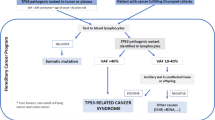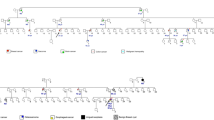Abstract
Li-Fraumeni and Li-Fraumeni-like syndrome (LFS/LFL) are clinically heterogeneous cancer predisposition syndromes characterized by diagnosis of early-onset and often multiple cancers with variable tumor patterns and incomplete penetrance. To date, the genetic modifiers described in LFS/LFL have been shown to map to either TP53 or its main negative regulator, MDM2. Additionally, all studies were focused on families with different TP53 germline mutations. Hence, in this study we explored the effect of the most studied polymorphisms of p53 pathway genes on clinical manifestations of individuals carrying the founder TP53 mutation R337H (n = 136) and controls (n = 186). Cancer-affected carriers had been diagnosed either with adrenocortical carcinoma (ACC, n = 29) or breast cancer (BC, n = 43). Allelic discrimation using TaqMan assay was used for genotyping MDM2 SNP 309 (rs2279744) as well as MDM4 (rs1563828) and USP7 (rs1529916) polymorphisms. We found significantly higher MDM2 SNP 309 GG genotype and G allele frequencies in the LFS cohort than in controls. Furthermore, median age at first diagnosis was earlier in MDM2 SNP309 GG carriers when compared to other genotypes for both cancers (ACC: age 1 vs. 2 years; BC: age 35 vs. 43 years, respectively), although not statistically different. The allelic and genotypic frequencies for all SNPs did not differ between cancer affected and unaffected carriers, neither between patients with ACC or BC. In conclusion, our results suggest that MDM2 SNP 309 may contribute to the LFL phenotype and also to an earlier age at diagnosis of ACC and BC cancer in carriers of the R337H founder mutation.
Similar content being viewed by others
References
Li FP, Fraumeni JF, Mulvihill JJ et al (1988) A cancer family syndrome in twenty-four kindreds. Cancer Res 48(18):5358–5362
Li FP, Fraumeni JF (1969) Soft-tissue sarcomas, breast cancer, and other neoplasms. A familial syndrome? Ann Intern Med 71(4):747–752
Li FP, Fraumeni JF (1969) Rhabdomyosarcoma in children: epidemiologic study and identification of a familial cancer syndrome. J Natl Cancer Inst 43(6):1365–1373
Malkin D, Li FP, Strong LC et al (1990) Germ line p53 mutations in a familial syndrome of breast cancer, sarcomas, and other neoplasms. Science 250(4985):1233–1238
Palmero EI, Schüler-Faccini L, Caleffi M et al (2008) Detection of R337H, a germline TP53 mutation predisposing to multiple cancers, in asymptomatic women participating in a breast cancer screening program in Southern Brazil. Cancer Lett 261(1):21–25. doi:10.1016/j.canlet200710.044
Custódio G, Parise GA, Kiesel Filho N et al (2013) Impact of neonatal screening and surveillance for the TP53 R337H mutation on early detection of childhood adrenocortical tumors. J Clin Oncol 31(20):2619–2626. doi:10.1200/JCO.2012.46.3711
Achatz MI, Olivier M, Le Calvez F et al (2007) The TP53 mutation, R337H, is associated with Li-Fraumeni and Li-Fraumeni-like syndromes in Brazilian families. Cancer Lett 245(1–2):96–102. doi:10.1016/j.canlet200512.039
Ribeiro RC, Sandrini F, Figueiredo B et al (2001) An inherited p53 mutation that contributes in a tissue-specific manner to pediatric adrenal cortical carcinoma. Proc Natl Acad Sci USA 98(16):9330–9335. doi:10.1073/pnas.161479898
Giacomazzi J, Selistre SG, Rossi C et al (2013) Li-Fraumeni and Li-Fraumeni-like syndrome among children diagnosed with pediatric cancer in Southern Brazil. Cancer 119(24):4341–4349. doi:10.1002/cncr.28346
DiGiammarino EL, Lee AS, Cadwell C et al (2002) A novel mechanism of tumorigenesis involving pH-dependent destabilization of a mutant p53 tetramer. Nat Struct Biol 9(1):12–16. doi:10.1038/nsb730
Malkin D (2011) Li-fraumeni syndrome. Genes Cancer 2(4):475–484. doi:10.1177/1947601911413466
Vousden KH, Prives C (2009) Blinded by the light: the growing complexity of p53. Cell 137(3):413–431. doi:10.1016/j.cell200904.037
Marcel V, Palmero EI, Falagan-Lotsch P et al (2009) TP53 PIN3 and MDM2 SNP309 polymorphisms as genetic modifiers in the Li-Fraumeni syndrome: impact on age at first diagnosis. J Med Genet 46(11):766–772 doi:10.1136/jmg.2009.066704
Bougeard G, Baert-Desurmont S, Tournier I et al (2006) Impact of the MDM2 SNP309 and p53 Arg72Pro polymorphism on age of tumour onset in Li-Fraumeni syndrome. J Med Genet 43(6):531–533. doi:10.1136/jmg.2005.037952
Caleffi M, Ribeiro RA, Duarte Filho DL et al (2009) A model to optimize public health care and downstage breast cancer in limited-resource populations in southern Brazil. (Porto Alegre Breast Health Intervention Cohort). BMC Public Health 9:83. doi:10.1186/1471-2458-9-83
Lee JT, Gu W (2010) The multiple levels of regulation by p53 ubiquitination. Cell Death Differ 17(1):86–92. doi:10.1038/cdd.2009.77
Brooks CL, Li M, Hu M, Shi Y, Gu W (2007) The p53–Mdm2–HAUSP complex is involved in p53 stabilization by HAUSP. Oncogene 26(51):7262–7266. doi:10.1038/sj.onc.1210531
Li M, Brooks CL, Kon N, Gu W (2004) A dynamic role of HAUSP in the p53-Mdm2 pathway. Mol Cell 13(6):879–886
Perry ME (2010) The regulation of the p53-mediated stress response by MDM2 and MDM4. Cold Spring Harb Perspect Biol 2(1):a000968. doi:10.1101/cshperspect.a000968
Renaux-Petel M, Sesboüé R, Baert-Desurmont S et al (2014) The MDM2 285G-309G haplotype is associated with an earlier age of tumour onset in patients with Li-Fraumeni syndrome. Fam Cancer 13(1):127–130. doi:10.1007/s10689-013-9667-2
Pinto C, Veiga I, Pinheiro M et al (2009) TP53 germline mutations in Portugal and genetic modifiers of age at cancer onset. Fam Cancer 8(4):383–390. doi:10.1007/s10689-009-9251-y
Tabori U, Nanda S, Druker H, Lees J, Malkin D (2007) Younger age of cancer initiation is associated with shorter telomere length in Li-Fraumeni syndrome. Cancer Res 67(4):1415–1418. doi:10.1158/0008-5472.CAN-06-3682
Ruijs MW, Schmidt MK, Nevanlinna H et al (2007) The single-nucleotide polymorphism 309 in the MDM2 gene contributes to the Li-Fraumeni syndrome and related phenotypes. Eur J Hum Genet 15(1):110–114. doi:10.1038/sj.ejhg.5201715
Wu CC, Krahe R, Lozano G et al (2011) Joint effects of germ-line TP53 mutation, MDM2 SNP309, and gender on cancer risk in family studies of Li-Fraumeni syndrome. Hum Genet 129(6):663–673. doi:10.1007/s00439-011-0957-1
Acknowledgements
We are grateful to Patricia Silva, Diego Paskulin and Cristina Brinckmann Netto for their valuable contributions and support. The authors also wish to thank Flávia Giusti and Rafael Bringhenti from Unidade de Patologia Experimental, Centro de Pesquisa Experimental. This work was supported by fellowships from Conselho Nacional de Desenvolvimento Científico e Tecnológico (CNPQ) and Coordenação de Aperfeiçoamento de Pessoal de Nível Superior (CAPES) and funded in part by Fundação de Amparo à Pesquisa do Estado do Rio Grande do Sul (FAPERGS-PPSUS) (Grant # 09/0103-0), FAPERGS-PRONEX (Grant #10/0051-9), Fundo de Incentivo à Pesquisa do Hospital de Clínicas de Porto Alegre (FIPE-HCPA) and CNPQ (Grant #478430/2012-4).
Author information
Authors and Affiliations
Corresponding author
Ethics declarations
Conflict of interest
The authors have no conflict of interest to declare.
Rights and permissions
About this article
Cite this article
Macedo, G.S., Vieira, I.A., Vianna, F.S.L. et al. p53 signaling pathway polymorphisms, cancer risk and tumor phenotype in TP53 R337H mutation carriers. Familial Cancer 17, 269–274 (2018). https://doi.org/10.1007/s10689-017-0028-4
Published:
Issue Date:
DOI: https://doi.org/10.1007/s10689-017-0028-4




